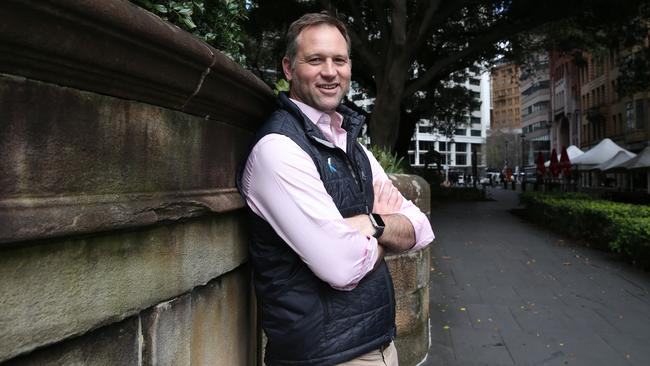More clarity needed for carbon trading market to take off says Xpansiv’s Ben Stuart
Australia’s carbon credit market is set to take off once there is more clarity around the government’s safeguard mechanism, says Ben Stuart, head of carbon trading exchange Xpansiv.

Australia’s carbon credit market is set to take off once there is more clarity about the workings of the federal government’s “safeguard mechanism”, according to the Australian head of carbon trading exchange Xpansiv, Ben Stuart.
“There’s still a bit of a vacuum about some of the points of detail of the safeguard mechanism, particularly in relation to baselines,” Mr Stuart said. “We don’t have a lot of clarity around the baselines for the individual entities.
“It’s a bit of a grey area at the moment. It’s the only thing that is really holding back the market getting going.”
The stricter safeguard mechanism, which will set emission reduction targets for the country’s largest carbon emitters, came into force on July 1.
The regime will require companies emit the most carbon, operating in 215 sites around Australia, to reduce emissions by 5 per cent a year.
They will have to reduce their total emissions by 43 per cent below 2005 levels by 2030 and reach net zero by 2050.
Those companies that cannot comply can offset some of their emissions by buying Australian Carbon Credit Units (ACCUs).
The Australian carbon credit trading market is estimated to be worth some $4.5bn, and is expected to be given a boost with the introduction of the new regime.
Some of the largest companies affected are still in negotiations with the government about how the mechanism will apply to their operations.
Mr Stuart – the president for transaction services at Xpansiv, a company backed by Blackstone and Macquarie that launched its local carbon trading exchange in April, said investors in the ACCU market were waiting for detail on how the new requirements would affect each of the 215 sites covered by the requirements. They were also interested in how the rules would apply to new gas projects.
“We are seeing increased interest from corporates and compliant entities positioning for the new regulations,” Mr Stuart said.
Once there was more clarity around the new scheme, investors and companies would have greater confidence in the potential demand for ACCUs.
The price of ACCUs, which are issued by the Clean Energy Regulator, has been affected by changes in government regulations. The price rose above $57 in January 2022 but fell sharply as a result of policy changes.
According to investment bank Jarden Australia, the price of ACCUs has fallen from around $39 in January to just over $28.
There were eight transactions involving the trade of 27,449 ACCUs on Xpansiv’s first day of trading on its Australian exchange on April 20. One ACCU represents about a tonne of carbon dioxide-equivalent.

Firms participating on the day included the Commonwealth Bank, Corporate Carbon, Carbon Financial Services, CO2 Australia, Duxton Carbon Investments, Gaia Natural Capital, BetaCarbon, Attunga Capital and brokerage firm HVB.
Mr Stuart said Xpansiv’s ACCU market had been trading daily since its launch, with trades ranging from hundreds to tens of thousands of ACCUs.
“We are starting to see a lot more interest. We are starting to see a lot more counterparties come on board,” he said.
He said some companies were looking to take advantage of the lower ACCU price to cover their potential exposure for years to come.
The baselines set for each site will determine how many ACCUs companies need to buy.
A new factor in the market is the ability for companies whose emissions fall below the baseline to be able to issue credits, which can be sold to other carbon emitters.
Mr Stuart said the local market was in its early stages, compared with other jurisdictions which had been operating for longer under stricter government emission requirements.
He said this was attracting international investors into the market to invest in companies generating ACCUs, mainly through carbon farming.
“Investors have seen these markets grow and develop elsewhere and are getting in at an early stage to the domestic market here,” he said.
Mr Stuart is co-founder of commodity spot exchange CBL Markets, which merged with San Francisco-based Xpansiv, a data-led ESG commodities platform, in 2019.
He said many questions about the validity of carbon credits in Australia had been “answered” by the recommendations of a report by former chief scientist, Ian Chubb, released in January.
But overseas experience showed that carbon credit markets were “constantly evolving” – including the methodology about what was accepted for carbon credits.
“The Chubb review was very helpful and good for the market to expand, but the market is constantly evolving,” he said. “We should continue to seek better methodologies along the way.”
He called on the government not to make any sudden or arbitrary changes to the rules governing the market.
“A lot of investment and trading decisions can be adversely affected by the stroke of a pen,” he said. “The less tinkering (after the new regime comes into play) the better.”
Originally published as More clarity needed for carbon trading market to take off says Xpansiv’s Ben Stuart





